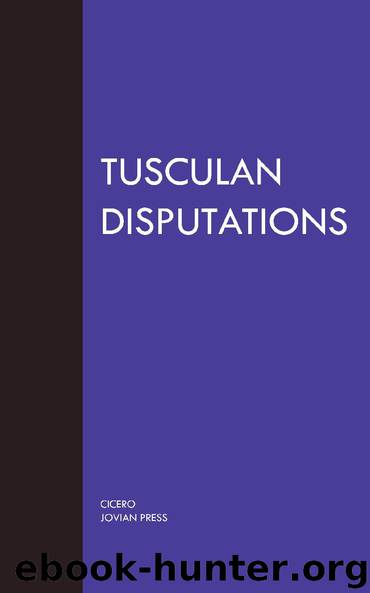Tusculan Disputations by Cicero

Author:Cicero
Language: eng
Format: epub, azw3
Publisher: Pronoun
* * *
BOOK II.
..................
I. WHEN COTTA HAD THUS concluded, Velleius replied: I certainly was inconsiderate to engage in argument with an Academician who is likewise a rhetorician. I should not have feared an Academician without eloquence, nor a rhetorician without that philosophy, however eloquent he might be; for I am never puzzled by an empty flow of words, nor by the most subtle reasonings delivered without any grace of oratory. But you, Cotta, have excelled in both. You only wanted the assembly and the judges. However, enough of this at present. Now, let us hear what Lucilius has to say, if it is agreeable to him.
I had much rather, says Balbus, hear Cotta resume his discourse, and demonstrate the true Gods with the same eloquence which he made use of to explode the false; for, on such a subject, the loose, unsettled doctrine of the Academy does not become a philosopher, a priest, a Cotta, whose opinions should be, like those we hold, firm and certain. Epicurus has been more than sufficiently refuted; but I would willingly hear your own sentiments, Cotta.
Do you forget, replies Cotta, what I at first said—that it is easier for me, especially on this point, to explain what opinions those are which I do not hold, rather than what those are which I do? Nay, even if I did feel some certainty on any particular point, yet, after having been so diffuse myself already, I would prefer now hearing you speak in your turn. I submit, says Balbus, and will be as brief as I possibly can; for as you have confuted the errors of Epicurus, my part in the dispute will be the shorter. Our sect divide the whole question concerning the immortal Gods into four parts. First, they prove that there are Gods; secondly, of what character and nature they are; thirdly, that the universe is governed by them; and, lastly, that they exercise a superintendence over human affairs. But in this present discussion let us confine ourselves to the first two articles, and defer the third and fourth till another opportunity, as they require more time to discuss. By no means, says Cotta, for we have time enough on our hands; besides that, we are now discussing a subject which should be preferred even to serious business.
II. The first point, then, says Lucilius, I think needs no discourse to prove it; for what can be so plain and evident, when we behold the heavens and contemplate the celestial bodies, as the existence of some supreme, divine intelligence, by which all these things are governed? Were it otherwise, Ennius would not, with a universal approbation, have said,
Look up to the refulgent heaven above,
Which all men call, unanimously, Jove.
This is Jupiter, the governor of the world, who rules all things with his nod, and is, as the same Ennius adds,
——of Gods and men the sire,
an omnipresent and omnipotent God. And if any one doubts this, I really do not understand why the same man may not also doubt whether there is a sun or not.
Download
This site does not store any files on its server. We only index and link to content provided by other sites. Please contact the content providers to delete copyright contents if any and email us, we'll remove relevant links or contents immediately.
The remains of the day by Kazuo Ishiguro(8955)
Tools of Titans by Timothy Ferriss(8351)
Giovanni's Room by James Baldwin(7305)
The Black Swan by Nassim Nicholas Taleb(7091)
Inner Engineering: A Yogi's Guide to Joy by Sadhguru(6778)
The Way of Zen by Alan W. Watts(6580)
Asking the Right Questions: A Guide to Critical Thinking by M. Neil Browne & Stuart M. Keeley(5743)
The Power of Now: A Guide to Spiritual Enlightenment by Eckhart Tolle(5734)
The Six Wives Of Henry VIII (WOMEN IN HISTORY) by Fraser Antonia(5490)
Astrophysics for People in a Hurry by Neil DeGrasse Tyson(5171)
Housekeeping by Marilynne Robinson(4425)
12 Rules for Life by Jordan B. Peterson(4293)
Double Down (Diary of a Wimpy Kid Book 11) by Jeff Kinney(4253)
The Ethical Slut by Janet W. Hardy(4234)
Skin in the Game by Nassim Nicholas Taleb(4226)
Ikigai by Héctor García & Francesc Miralles(4223)
The Art of Happiness by The Dalai Lama(4117)
Skin in the Game: Hidden Asymmetries in Daily Life by Nassim Nicholas Taleb(3980)
Walking by Henry David Thoreau(3941)
